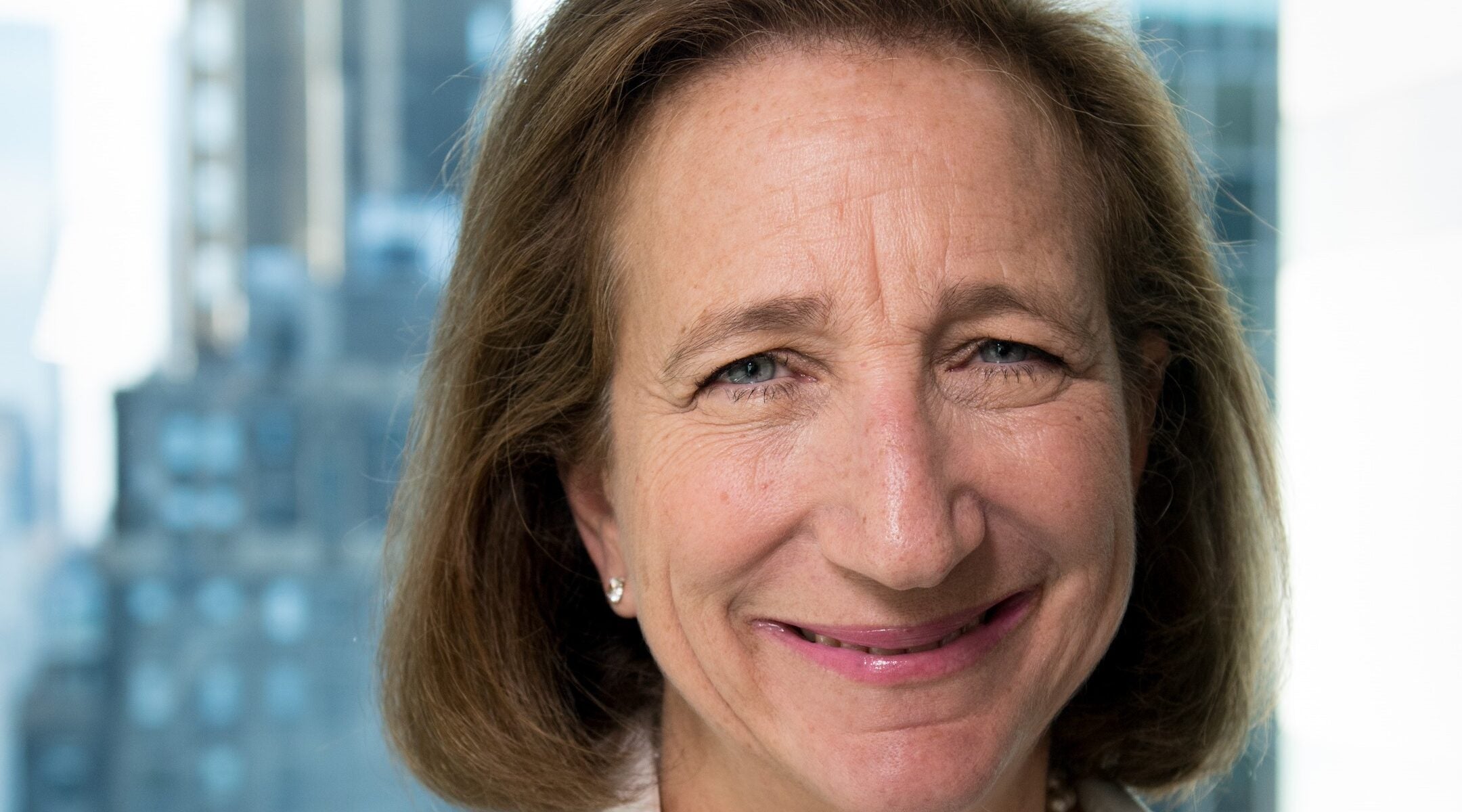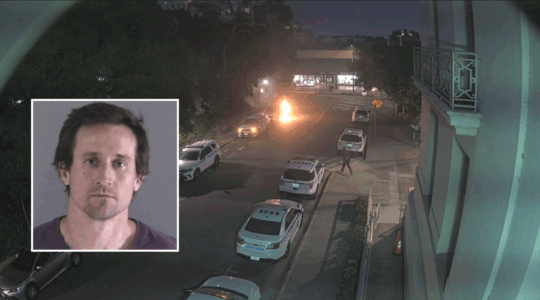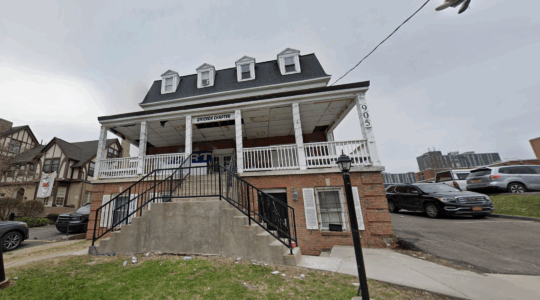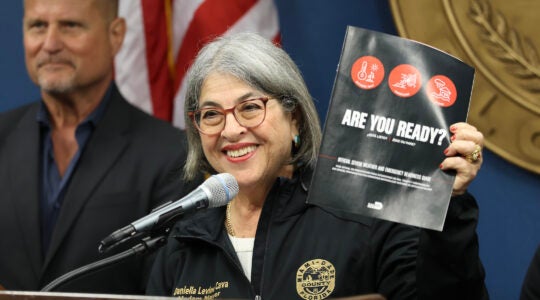In the 18 years that Julie Sandorf has served as its president, the Charles H. Revson Foundation has launched and supported initiatives in Israel that she admits are hard to categorize.
There’s the fellowship for young Israelis interested in urban planning. An effort to expand civic service — an alternative to military service — to Arab youth as well as Jews kept out of the army due to criminal records, disabilities or low educational achievement. Emergency, no-strings-attached grants to Israeli journalists following Oct. 7.
“I see why these pieces feel a little disparate. They’re actually not,” Sandorf said in an interview this month. “They actually all fit together in this dream of a Jewish and democratic state that has a heart big enough — and I truly believe that of Israeli society — to be a place for all citizens.”
It’s a dream Sandorf has chased since taking over at the foundation in 2008, and one she will pass on to a successor at the end of the year. The foundation — started by the late cosmetics mogul in 1956 — announced this month her decision to step down after a term in which the foundation gave away some $118 million in four core areas: biomedical research, education, Jewish life and urban affairs.
“Her strategic philanthropy reinvigorated public libraries and boosted their impact, revived local journalism, established a multi-faith center for pastoral care [at the Jewish Theological Seminary], and spearheaded civic service and community development in Israel among other projects,” according to the foundation’s announcement.
Saying “it’s time” to make way for a next-generation leader, Sandorf, 67, reflected on how a foundation best known for addressing quality-of-life issues in New York City and revitalizing local news media across the United States extended that mission to Israel and Jewish life. She also discussed why she has faith in Israeli civil society, even as many Israelis themselves are saying that the country’s democratic institutions have been tested to the breaking point by a right-wing government and almost two years of war.
“This is a country with extraordinary social capital, across religious divides, across ethnic divides, across income divides,” she said, recalling a visit to Israel in 2008, the first of many as the foundation’s president. “The strength of family networks and an absolute sense of mutual responsibility for each other and obligation to service just blew my mind.”
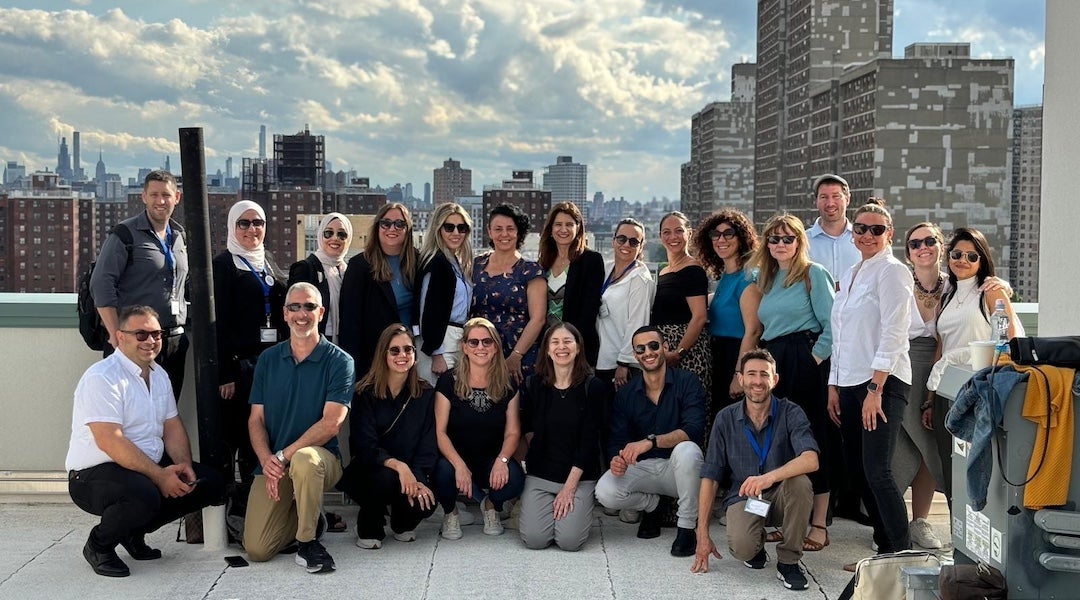
The Revson Foundation supports Cadets for Local Government, which brings public policy professionals from Israel to New York City to learn about housing policy and neighborhood revitalization. (Courtesy Charles H. Revson Foundation)
Drawing on her own experience in urban planning — she got her start in the struggling South Bronx working for what is now the MBD Community Housing Corporation — she early on identified gaps in Israeli policy when it came to housing financing and development. The issue came to a head in 2011, when Israelis took to the streets to protest the high cost of living.
The foundation invested in the Edmond de Rothschild Foundation’s Cadets for Local Government, which provides Israelis with university training in affordable housing and urban regeneration, including field study in New York and Baltimore. The foundation also funds efforts to recruit and provide scholarships to Arab students who provide technical assistance and policy expertise in their hometowns, where Israeli law often limits housing options for the Arab minority.
The program brings “unbelievably committed young people to public service, to create a better way to redevelop their own communities, cities and towns, whether they landed up in the prime minister’s office or in a municipality or in a private consultancy,” she said. “They are bringing new energy, new thoughts, new ideas, to what was and is a very sclerotic system.”
Less successful was an idea, in 2014, to create a special-purpose Israel bond that would allow investments in affordable housing inside the Green Line, the dividing line between Israel and the West Bank. The idea didn’t get off the ground, which Sandorf chalks up to politics and “a rigidity and level of arrogance on the part of the government.” She remains a critic of how Israel administers the bonds program, penning a Times of Israel oped in March 2023 saying “there is no transparency about how the proceeds are spent.”
Writing when the Israeli government was facing pro-democracy protests over its plans to reduce the power of its judiciary, she suggested that investors redeem their Israel bonds and donate instead to “institutions that foster democratic values, pluralism and opportunity for all Israeli citizens.”
In the same essay, she criticized Finance Minister Bezalel Smotrich, whose office oversees Israel Bonds and maintains discretion on how they are used, writing that his “far-right ideology could drag Israel into committing war crimes.”
Despite her criticism of the government, Sandorf said she draws inspiration from the tens of thousands of Israelis who protested then and who continue to demand an end to the war and the return of the Oct. 7 hostages.
“It’s upwards of 70% of Israelis who think that the government is not doing the right thing and that there should be an end of the war and release of hostages. To me that says this country has a real future,” she said.
Promoting a healthy democracy is also the impetus behind the foundation’s support for local media, which has ranged from building out the digital operation at WNYC, New York’s public radio station, to expanding Cornell Law School’s First Amendment Clinic, to leading a successful advocacy campaign urging New York City, under the Bill de Blasio administration, to spread its advertising spending among community media. Since then, she said, $72 million has gone to local outlets.
“If there is not a strong, authoritative, credible, trustworthy fourth state that holds institutions of power accountable and provides basic civic information where people trust in and have a sense of our common knowledge, democracy can’t function,” she said. “Period.”
The interest in local media extends to the Revson Foundation’s Jewish giving: Grantees include the Jewish Telegraphic Agency, to create our archives and website, and JTA’s parent company, 70 Faces Media; “Israel Story,” the award-winning podcast, and Shomrim, an Israel-based nonprofit news organization that provides on-the-job training to young journalists from Israel’s Arab and haredi Orthodox sectors.
The foundation worked through Shomrim in establishing the emergency fund that after Oct. 7 gave out $2,000 grants to 170 frontline Israeli journalists, to use how they saw fit.
That was “important in Israel, because the people on the ground, the frontline journalists on the ground, were the only people who had the knowledge, the cultural competency, the background, the experience to report what was going on in as clear and as honest a way as possible, and that voice had to be supported,” she said.

Young israelis living on Rothschild Boulevard in Tel Aviv in protest of high housing prices, Aug. 10, 2011. Julie Sandorf applied her background in housing policy in directing grants to Israeli programs addressing the issue. (Liron Almog/Flash90)
Sandorf grew up on New York’s Long Island, and remembers the skepticism from Bronx activists when as a “white, Jewish girl” she sought a job, in 1983, with the community development corporation known as the “Mid Bronx Desperadoes.” The organization sought help from city and private agencies, banks, philanthropies and local businesses to rescue a community that had become a national symbol of urban decay.
Genevieve Brooks, the group’s leader, championed Sandorf, who now hopes to return the favor: One of her retirement goals is writing a book about the South Bronx and Brooks, now considered a hero of urban revitalization.
Sandorf went on to become NYC program director for the Local Initiatives Support Corporation and founder and president of the Corporation for Supportive Housing, which she ran from 1991 to 1998.
Immediately before coming to Revson, she was the co-founder and executive director of Nextbook, which promoted Jewish literature through a magazine and a partnership with Schocken Books.
Sandorf said she “grew up in a completely secular home”: What she describes as her “Jewish journey” began when her daughter was attending nursery school at Riverside Church on New York’s Upper West Side and declared that she wanted to become a Christian. Her family became members of the Reform Stephen Wise Free Synagogue and, for 25 years, the independent congregation B’nai Jeshurun.
“I knew the kind of struggles of secular Jews to try to understand who they are and and knew that in moments of crisis, you go to someone you know, a spiritual leader you trust,” she said. “That’s how you make the connections for people who aren’t sure they want to lead a whole Jewish life.”
That was her thinking when she approached Arnold Eisen, then the chancellor of the Conservative movement’s Jewish Theological Seminary, about creating what became the Center for Pastoral Education at JTS. Founded in 2010 by Rabbi Mychal B. Springer and now headed by Rabbi Naomi Kalish, it trains clergy from all faiths in providing spiritual and emotional support to individuals, families and communities. The Revson Foundation was among the funders of a recently released prayer book to be used by Jewish chaplains at Rikers Island, New York City’s largest jail.
The same impulse to reach Jews along their own journeys led the foundation, starting in 2020, to boost Hillels at the City University of New York, the system of public colleges that even before Oct. 7 had been roiled by pro-Palestinian protests and complaints of antisemitism from Jewish students and faculty.
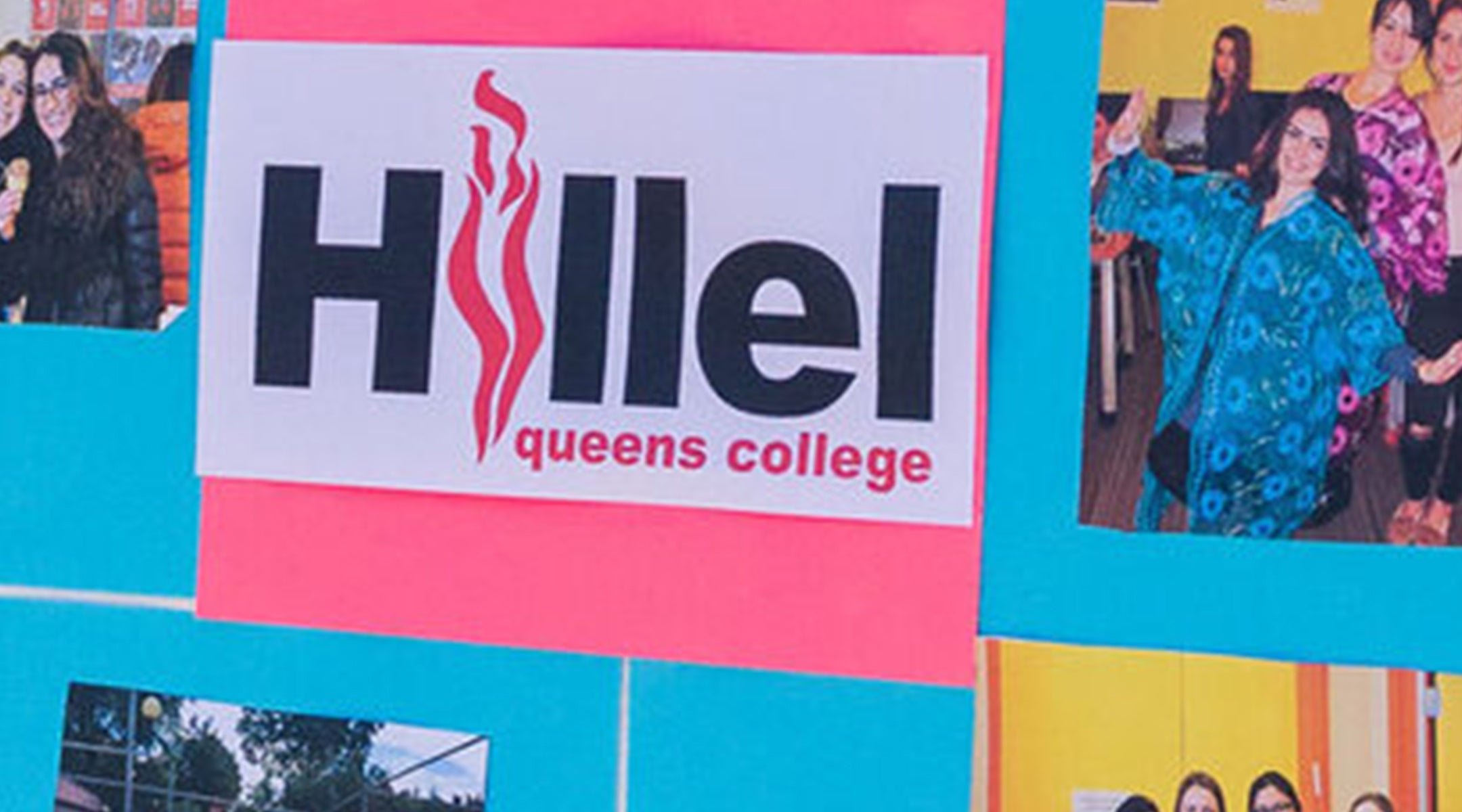
A bulletin board at Queens College Hillel shows students activities at the Jewish campus club. Since 2020, Revson has invested in the CUNY Hillels. (Courtesy CUNY)
Sandorf noted that the system’s five Hillels, which serve over 13,000 Jewish students on primarily commuter campuses, receive a fraction of the funding of private colleges with considerably smaller Jewish populations.
“CUNY is the great equalizer,” she said, as it continues to serve low-income students, the children of immigrants and Jews who themselves are first-generation college students or first-generation Americans.
Sandorf hopes her successor, who hasn’t been named, will be “an open- minded pluralist” with “a hard head and a big heart, because you need both.” She says that’s a lesson she learned from her trustees and two of her predecessors: the late Eli Evans, the author and foundation exec who brought “Sesame Street” to Israel, and Lisa Goldberg, who was just 54 when she died in 2007.
“They always had a door open for somebody to walk in with an amazing idea. It doesn’t happen very often, but it happens every so often, and I found that approach incredibly appealing,” she said. “I just really admired both the types of grant making they did and the way they did [it], and I hope I’ve honored that legacy where we shifted a bit.”
JTA has documented Jewish history in real-time for over a century. Keep our journalism strong by joining us in supporting independent, award-winning reporting.
